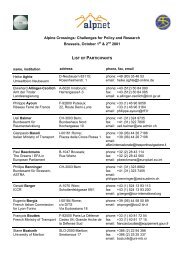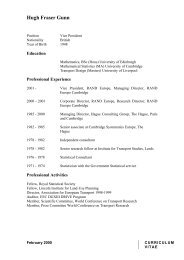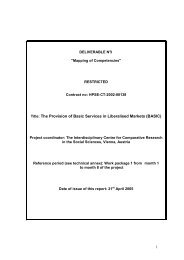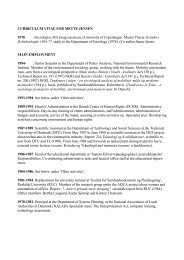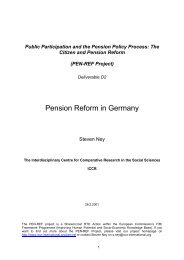The Housing Dimension of Welfare Reform - the ICCR
The Housing Dimension of Welfare Reform - the ICCR
The Housing Dimension of Welfare Reform - the ICCR
You also want an ePaper? Increase the reach of your titles
YUMPU automatically turns print PDFs into web optimized ePapers that Google loves.
Europe. Across <strong>the</strong> EU-14, 54 per cent <strong>of</strong> low income respondents live in<br />
good standard accommodation as compared to 67 and 78 per cent <strong>of</strong> <strong>the</strong><br />
middle and high income classes respectively. <strong>The</strong> association between<br />
low income and sub-standard accommodation is strongest in <strong>the</strong> Iberian<br />
Peninsula: In Portugal only 5 per cent <strong>of</strong> <strong>the</strong> low income class lives in<br />
good standard accommodation; <strong>the</strong> respective share in Spain is, with 18<br />
per cent, higher but likewise significantly lower than <strong>the</strong> European<br />
average. At <strong>the</strong> o<strong>the</strong>r end <strong>of</strong> <strong>the</strong> scale, accommodation standards are<br />
highest in Denmark, Germany, Luxembourg and <strong>the</strong> UK: <strong>the</strong>re, good<br />
accommodation standards are enjoyed by <strong>the</strong> overwhelming majority,<br />
including <strong>of</strong> <strong>the</strong> lowest income classes (above 80 per cent). A similar<br />
pattern, albeit not as strong, is found in France and Austria.<br />
<strong>Housing</strong> problems. Even in Germany, Luxembourg and <strong>the</strong> UK where<br />
<strong>the</strong> share <strong>of</strong> good standard accommodation is high also among <strong>the</strong> lower<br />
income classes, <strong>the</strong> latter are more likely to report housing problems. <strong>The</strong><br />
exception would appear to be Denmark and Austria. <strong>The</strong>re, <strong>the</strong> share <strong>of</strong><br />
persons reporting problems with housing does not alter significantly with<br />
income.<br />
Table 5 displays <strong>the</strong> risks <strong>of</strong> persistent poverty among persons residing<br />
social housing dwellings as compared to those owning <strong>the</strong>ir<br />
accommodation and those in <strong>the</strong> private rentals sector. It should be<br />
recalled that in most countries social housing is primarily allocated to and<br />
serves as ‘shelter’ for those in persistent poverty.<br />
Table 5. Risks <strong>of</strong> persistent poverty 1994-1997 and housing (in %)<br />
Social housing Private rentals Owners All<br />
Austria 3 8 5 5<br />
Belgium 18 5 6 6<br />
Denmark 2 1 2 2<br />
France 17 6 8 9<br />
Germany 5 7 3 5<br />
Ireland 26 11 4 7<br />
Italy 10 9 5 6<br />
UK 12 16 6 7<br />
EU-8 12 8 5 7<br />
Source: <strong>ICCR</strong> own calculations <strong>of</strong> ECHP UDB (Waves 1 to 4), Version 09/2001; for Germany <strong>the</strong><br />
ECHP database is based on national SOEP, for UK on national BHPS.<br />
We can summarise <strong>the</strong> main findings as follows:<br />
- Social housing in Austria and Denmark appears indeed to be a<br />
guarantee against <strong>the</strong> risk <strong>of</strong> poverty. In Austria especially, social<br />
EUROHOME-IMPACT FINAL REPORT 43



